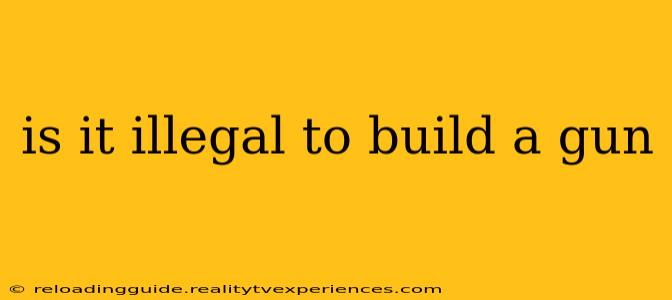Is It Illegal to Build a Gun? The Complexities of Homemade Firearms
The legality of building a gun at home is a surprisingly complex issue, varying significantly depending on your location and the specifics of the firearm. There's no single, simple answer. While some construction is explicitly legal, other methods are strictly prohibited. Understanding the nuances is crucial to avoid serious legal consequences.
Federal Regulations in the United States
At the federal level in the United States, the Gun Control Act of 1968 (GCA) and the National Firearms Act of 1934 (NFA) are the primary governing laws. These acts regulate the manufacture, sale, and possession of firearms. Crucially, they don't outright ban all homemade firearms, but they heavily regulate certain aspects:
-
Registered Firearms Manufacturers: Individuals who manufacture firearms for sale or distribution must register with the Bureau of Alcohol, Tobacco, Firearms and Explosives (ATF) and comply with stringent regulations. This is not relevant to individuals making guns solely for personal use.
-
Serial Numbers: Firearms manufactured for sale must have serial numbers. This requirement typically does not apply to personally-made firearms intended solely for private use. However, the lack of a serial number can complicate matters in certain situations.
-
Specific Parts and Designs: The NFA regulates certain types of firearms, including machine guns, short-barreled rifles and shotguns, and silencers. Building these requires significant paperwork, registration, and strict adherence to ATF rules. Violating these regulations can result in serious penalties.
-
The "Ghost Gun" Debate: The term "ghost gun" commonly refers to firearms built from kits or individual parts lacking serial numbers, often assembled without background checks. While not inherently illegal to possess a ghost gun, the ambiguity around their legal status, especially concerning their sale or transfer, has led to increased legislative scrutiny and varying state-level restrictions.
State Laws: A Patchwork of Regulations
State laws regarding homemade firearms add another layer of complexity. States have considerable autonomy in regulating firearms, leading to significant variations across jurisdictions. Some states have stricter regulations than the federal government, while others may have more permissive laws.
For example, some states might require background checks for the purchase of even individual parts used in firearm construction, effectively limiting the ability to build a gun without going through official channels. Others might place restrictions on certain types of firearms that can be constructed at home.
Key Considerations for Home Gunsmithing
Even in areas with relatively permissive laws, building a firearm requires careful consideration:
-
Safety: Constructing a firearm requires a high level of skill and knowledge to ensure its safe operation. Improperly built firearms can be extremely dangerous, posing a risk to the builder and others.
-
Liability: If a homemade firearm malfunctions and causes harm, the builder could face significant legal liability. Comprehensive liability insurance might be difficult to obtain for this type of activity.
-
Legal Counsel: Given the complexity of federal and state regulations, consulting with a legal professional specializing in firearms law is strongly recommended before attempting to build a gun. They can provide accurate advice based on your specific location and intended design.
Disclaimer: This information is for educational purposes only and does not constitute legal advice. Laws regarding firearm construction are complex and subject to change. Always consult with legal counsel and relevant authorities before undertaking any firearm-related activities.

